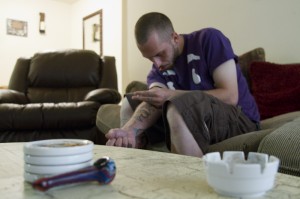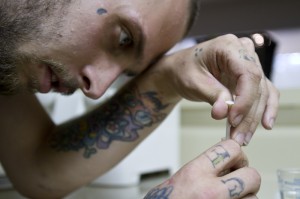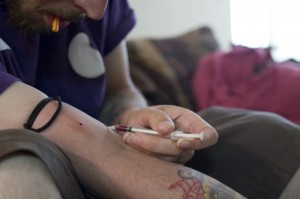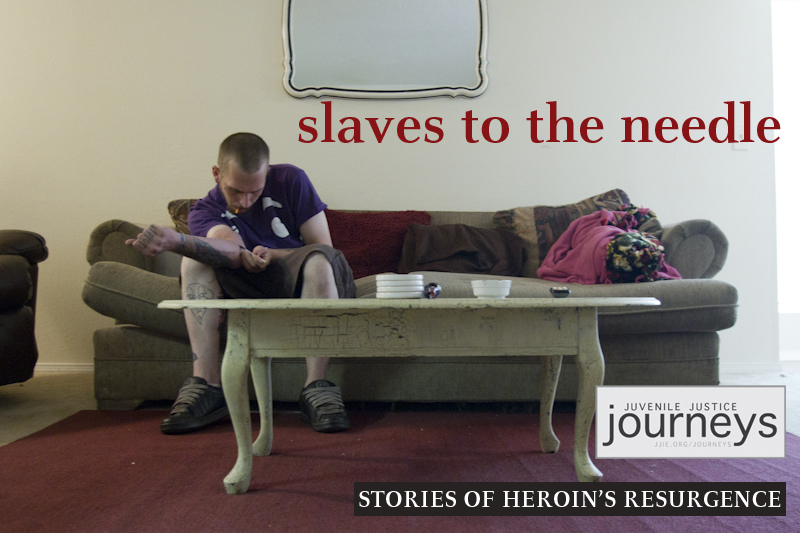
Photo by Clay Duda
“People are going to take drugs and have sex,” Mona Bennett told me matter-of-factly.
Bennett works at the Atlanta Harm Reduction Center (AHRC) in an area of southwest Atlanta known as the Bluffs, one of the city’s most poverty- and crime-ridden neighborhoods. AHRC runs the only needle exchange in Georgia and three days a week staffers set up shop on a street corner. For an hour and a half, heroin users can bring used, dirty needles and exchange them for new, clean ones. In 2010 alone, AHRC disposed of nearly 50,000 used needles while handing out nearly 60,000 new needles.
It’s all about “trying to protect people and helping them make healthier, wiser choices,” Bennett said.
But the distribution of syringes is not always legal, and that includes Georgia. The law also says that handing out needles for a “legitimate medical purpose” is an affirmative defense.
“That’s what we’ve based all of this on,” Bennett said. And although the police have occasionally come around asking questions, no one has ever been arrested.
However, despite all their work, the ARHC is limited by its size and budget, Bennett said. They can serve only a small area of the city. Bennett hopes to expand in the future, but only time will tell.
*****

Chris Davis. Photo by Clay Duda
Chris Davis, a 24-year-old from Powder Springs, a suburb of Atlanta, has survived for eight years as a heroin addict. But despite rehab and prison, Chris always found himself going back to heroin. The addiction took his life away, he said. He dropped out of college, lost his fiancée and now wakes up each morning in a pool of sweat trying not to vomit.
“I look at myself in the mirror,” Davis said, “and I think of who I am to myself and I just think, ‘You’re fucking nobody at this point.’”
But, he said, “because it’s taken everything from me, it’s almost the last thing I have.
“You ever heard the phrase ‘chasing the dragon’?” Davis asked. “The dragon is that first high you get when you first start doing [heroin] and you’re chasing that afterwards.”
To keep the chills at bay, to keep from vomiting, to stop feeling like there’s another person “trying to claw their way out” of him, Davis said he has to keep using.
“Hell,” he said, “I have to have a shot to even myself out to be able to go to work everyday. Of course you’re probably sitting there thinking, ‘Why the fuck does he do it still?’ I almost couldn’t even give you a real answer on that, other than addiction.”
Davis said he planned to go to a methadone clinic in a few days to try one more time to get clean. Until then, he continued to shoot up.
*****
“I don’t know if it’s something you’re born with or if your brain changes over time,” Chris Blum said, “but when you get right down to it, addiction is addiction.”
In rehab, Blum began a 12-step program.
“Steps one and two were fairly simple for me,” Blum said. “I already knew I was a fucking disaster. I knew I needed outside help.”

Photo by Clay Duda
After 40 days, in order to make it through the next 10 steps, Blum decided to cooperate.
“If I’m going to do this, I’m going to fucking do this,” he remembers thinking. “I’m going to do everything they tell me to.”
The third step asks the addict to turn their lives “over to the care of God” as they “understand God.” Blum took this to heart, exploring world religions and philosophies.
“I found that all of them have two things in common: love and compassion,” Blum said. “You know what? Love and compassion: that’s my god.”
“I started the praying, the meditating,” Blum said. “I started becoming aware of what’s going on. And once you become aware you can’t deny it. I don’t care who you are, you can’t turn your back on it.”
Blum’s connection with spirituality inspired him to pass what he learned on to others.
“That became part of my living amends,” Blum said, referring to another step in the recovery process. Addicts working through the 12-steps are encouraged to make amends to everyone they hurt through their addiction. In Blum’s case, that was impossible.
“A lot of these people I hurt, I don’t know who they are,” Blum said. “I can’t go back and say, ‘Hey man, I’m the dude that jacked you for $2,500.’ So this became my living amends.”
Of course, there was still the matter of his family.
“We sat down and I told them, ‘I’ve apologized to ya’ll a thousand times. Apologies ain’t going to cut it. All I can do is prove to you that this is what I want and that I’m a better person for it.’”
But without the 12 steps, he said, he could never have come as far as he has. In September, Blum will take the exam to become a certified addiction counselor. After years of struggle, Blum is ready to share what he’s learned and help other people come out the other side, the same way he did.
“Whatever God brings me, I take,” Blum said.

The producers of this short film are both recovering addicts who have both spent time living and indulging with drug addiction in Vancouver’s Downtown Eastside.
http://www.archive.org/details/VancouverAddictionHomelessChaosPoverty
I don’t understand what the guy who got clean has to do with the needle exchange program. In fact, the reason I’m skeptical of needle exchanges is that many don’t seem to have helping people get into recovery as a clearly stated goal – I’ve encountered needle dispensers who clearly romanticize the drug and the users and *want* to help people continue to get high rather than better. As long as harm reduction programs have people like that working for them they will not have credibility.
I agree with the gentleman from Australia, thinking like the doctor above is outdated. Methadone in this country is a for profit industry and does little to help with addiction. We need needle exchange country wide, but sadly the southern states are not exactly harm reduction friendly. Needle exchange not only helps with risk reduction regarding HIV, but more importantly it helps with reducing Hepatitis C transmission. Thats 4 million plus in the US.
Needle Exchange programs have been in place since the mid 80s all over Australia. IV drug users can get needles in many places in every city and even in country towns. We have one of the lowest rates of HIV transmission from needle sharing in the world. USA should do this as well.
Response from Dr. Philip Paris
Should we be giving needles to heroin addicts? It is safer, avoiding the contamination and spread of disease through the use of unclean needles. Still, I wish all of those addicts going for clean needles would go one more step and join a methadone maintenance treatment program. Those same people are still unable to function well, unable to maintain important family and friends in their life and still risking overdose from injecting heroin. And no question, they are more likely to be committing theft or prostitution in order to support their habit. No, I cannot really feel comfortable with needle exchange programs.